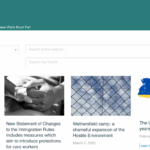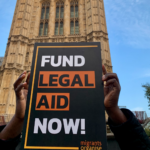News stories from the world of asylum, immigration, human rights and NCADC. Look out for our campaign review of the year in January!
—-
JANUARY
 The year commenced with an important legal victory for human rights, as explained by Rosalind English on theUK Human Rights Blog:
The year commenced with an important legal victory for human rights, as explained by Rosalind English on theUK Human Rights Blog:The Home Affairs Select Committee reported on enforced removal contracts, which raised concerns that the potentially lethal ‘head-down’ restraint technique is used during enforced removals, that racist language is used by escort staff, that there are too many escorts used in operations, and that risk assessments focus on the risk to escort staff rather the individual being removed.
 The end of March and the beginning of April saw a fortnight of events to celebrate Young People Seeking Safetyweek, the second national, annual celebration.Events took place in Leicester, Cardiff, Norwich, Glasgow, London, Manchester and Sheffield. There were graffiti workshops, poetry writing and reading, art exhibitions, parties, conferences and more.
The end of March and the beginning of April saw a fortnight of events to celebrate Young People Seeking Safetyweek, the second national, annual celebration.Events took place in Leicester, Cardiff, Norwich, Glasgow, London, Manchester and Sheffield. There were graffiti workshops, poetry writing and reading, art exhibitions, parties, conferences and more.
YPSS fortnight 2013 will take place from March 22 – 5 April. Contact lisa@ncadc.org.uk if your local group would like to take part!

The concern about deportations by charter flight to Sri Lanka – where there is credible evidence of torture of refused asylum seekers on return – was widespread and on 29 May, Human Rights Watch called for an end to deportations to Sri Lanka:
“The United Kingdom should immediately suspend deportations of ethnic Tamil asylum seekers to Sri Lanka and review its policies in assessing these claims …
Investigations by Human Rights Watch have found that some failed Tamil asylum seekers from the United Kingdom and other countries have been subjected to arbitrary arrest and torture upon their return to Sri Lanka. In addition to eight cases in which deportees faced torture on return reported in February, Human Rights Watch has since documented a further five cases in which Tamil failed asylum seekers were subjected to torture by government security forces on return from various countries, most recently in February 2012.
“The British government’s asylum procedure is failing to identify Tamils at risk of torture upon return to Sri Lanka despite growing evidence that torture of Tamil activists deported from abroad occurs,” said David Mepham, UK director at Human Rights Watch. “Until the government can fairly and thoroughly assess asylum claims based on up-to-date human rights information on Sri Lanka, it should suspend returns.”
Also in May, Medical Justice released their report The Second Torture, revealing that victims of torture are routinely being held in immigration detention centres in breach of the government’s own rules, a new investigation has revealed.
The report found that Rule 35, which should prevent torture victims being locked up in all but exceptional cases, is routinely flouted. This report s uncovered systemic failures on the part of UKBA and its contractors to follow statutory law and provisions.
- In June, we launched a new national campaign: Stop Deportations to Afghanistan! NCADC hosted a large and lively public meeting in London to gather together all those concerned about mass deportations to Afghanistan.
- The week before, over 1,000 people had marched in Glasgow to demonstrate for refugee rights.
- Also in June, the country guidance case on Zimbabwe (EM and Others) was quashed, meaning that the most definitive treatment of risk on return to Zimbabwe is the previous Country Guidance case of RN (Returnees) Zimbabwe CG [2008] UKAIT 0008.
The story that was to dominate immigration news for the rest of the year broke in June – the changes to the immigration rules, particularly those affecting family migration and Article 8.

Stark choice under new immigration rules: exile or family breakup
Alan Travis, The Guardian, 8 June 2012
The Iraqi parliament has banned the forced return from Europe of tens of thousands of failed asylum seekers and threatened to fine airlines that take part in deportation programmes. The unilateral declaration has already resulted in deportees being turned back at the border, according to the London-based refugee support organisation that has lobbied for the policy change.
Despite this ruling, many Iraqi detainees in the UK still fear deportation to Iraq where their lives are at risk. Hindi Abed told her husband’s story in a further Guardian piece (“If he is sent back to Iraq, he will be killed”):
A few days later, we heard how Home Office officials planned to worsen the health of an Iraqi asylum seeker who had a mental illness in the hope of putting pressure on him to leave the UK” (Diane Taylor, Guardian, 5 July).
On a more positive note, NCADC held a double documentary screening:Denied, Detained, Deported. We screened the films – How Long is Indefinite? and Hamedullah: The Road Home at 93 Feet East in London where we were joined by a packed audience and the films’ directors.
It was also a big month for crucial legal judgements:
- in RT (Zimbabwe), the Supreme Court held that asylum seekers cannot be expected to lie or dissemble in order to achieve safety in their own country.
- and KA (Afghanistan) was a ‘significant step forward for young asylum seekers’ which could be relevant to the cases of many asylum seekers who claimed asylum under the age of 18 (not just Afghans).
—
AUGUST
 Unsurprisingly, the Olympics dominated the headlines in August. As well as garnering some pro-immigration coverage, some high-profile asylum claims received attention.
Unsurprisingly, the Olympics dominated the headlines in August. As well as garnering some pro-immigration coverage, some high-profile asylum claims received attention.
The first news reports were of ‘an East African athlete’ entering a police station in Leeds to claim asylum, and suggestions that three Sudanese athletes who had gone missing will be seeking asylum in the UK.
Cameroon was next though The Guardian coverage of the story failed to emphasise thehuman rights abuses in Cameroon that lead people to seek safety in the UK:
Seven Olympic athletes have disappeared amid fears they have fled the London 2012 Games to claim asylum, according to team officials. Five boxers, a swimmer and a footballer from Cameroon were reported missing earlier this week leading team officials to suggest they had “defected.”
Then Weynay Ghebresilasie, Eritrea’s flag-carrying runner and three other Eritrean athlestes, sought asylum in UK to flee Eritrea’s “repressive regime”.
—
SEPTEMBER
 In September, NCADC held our annual conference and general meeting, which included the official launch of our campaigning toolkit.
In September, NCADC held our annual conference and general meeting, which included the official launch of our campaigning toolkit.
—
At the end of October, there was the sad news of another death in immigration detention. Prince Ofosu, a 31 year old Ghanaian man. According to a member of the detention centre staff, Prince was ‘stripped naked at the block [rule 40] and the heating system was turned off. He was left in the cold without even a duvet till his death 24 hours’ later.’
 On 8 November, the UK parliament’sHome Affairs Committee published a report of its latest Inquiry into the work of the UK Border Agency. The Committee has now published their report online with the headline “Border Agency’s backlog spiralling out of control”, and that was the angle taken up by the media – that and the terrible spectre of an amnesty for “illegal immigrants”.
On 8 November, the UK parliament’sHome Affairs Committee published a report of its latest Inquiry into the work of the UK Border Agency. The Committee has now published their report online with the headline “Border Agency’s backlog spiralling out of control”, and that was the angle taken up by the media – that and the terrible spectre of an amnesty for “illegal immigrants”.—
Also in November, a new report – A Prison in the Mind – from Gatwick Detainees Welfare Group highlighted the mental health implications of immigration detention.
Detention Action’s campaign to end indefinite detention hit the headlines, and the Detention Forum of which NCADC is part, published its strategy document ‘Roadmap for change – how we will challenge immigration detention’.
Plus, Santa paid a visit to the UKBA Brand Street office in Glasgow to protest against dawn raids and child detention.















Discussion: